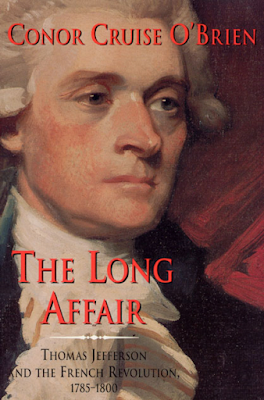Related: David L. Holmes: Jefferson's Theology.
Donal Conor David Dermot Donat Cruise O'Brien (3 November 1917 – 18 December 2008, often nicknamed "The Cruiser", was an Irish diplomat, politician, writer, historian and academic, who served as Minister for Posts and Telegraphs from 1973 to 1977, a Senator for Dublin University from 1977 to 1979, a Teachta Dála (TD) for the Dublin North-East constituency from 1969 to 1977, and a Member of the European Parliament (MEP) from January 1973 to March 1973.
An excerpt from, "The Long Affair: Thomas Jefferson and the French Revolution, 1785-1800" By Conor Cruise O'Brien, University of Chicago Press, 1996:
In an address at Michigan State University on 5 May 1995, President Clinton warned right-wing paramilitaries not to attempt "to appropriate our sacred symbols for paranoid purposes."
The President was speaking in the aftermath of the destruction, apparently by American right-wing fanatics, of the Federal building in Oklahoma City and its occupants on 19 April 1995. The aftermath of that ghastly act had brought media reports of widespread paramilitary conspiracies in several states—and notably around the militia groups in Michigan—for the organization of armed resistance to the Federal Government. The President was seeking to exclude such conspirators from what is called "the American civil religion."
There is quite a copious literature about the American civil religion and, while there are differences about the exact nature of this powerful but nebulous concept, there is also a broad consensus about its general nature.
The term "civil religion" was first used by Rousseau and refers to "the religious dimension of the polity." American civil religion has been summed up as "an institutionalized collection of sacred beliefs providing sources of cohesion and prophetic guidance through times of national crises."2 Among the sacred beliefs, a cult of liberty has been important from very early on. Robert N. Bellah quotes a 1770 observer as noting that "the minds of the people are wrought up to as high a degree of enthusiasm by the word liberty as could have been expected had religion been the cause."
In the American civil religion, liberty, nationalism, and faith are fused. As Norman Mailer put it: "In America the country was the religion. And all the other religions of the land were fed from that first religion."
James H. Smylie declared, around the same time: "Civil religion is the way we have identified ourselves as God's people and under his providence, the way we have invoked divine sanction in the use of power and in the support of civil authority and the way in which we justify our national actions."
Central to the American civil religion are two eighteenth-century documents: the Declaration of Independence and the Constitution. Around these documents, and linked with them in the religion, is a limited number of historical figures; for all Americans, the Founding Fathers; for most Americans, also Abraham Lincoln. In the pantheon of the American civil religion, however, two holy personages stand out with larger halos.
Video Title: Myth of Thomas Jefferson O'Brien. Source: Congressional Research Institute 2. Date Published: June 7, 2022.
